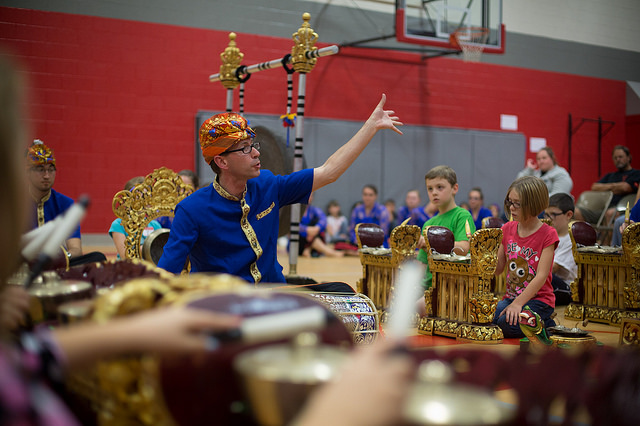 Because the instruments in a Balinese gamelan angklung orchestra are tuned in specific relation to one another, and most are made of bronze, an expensive metal, the development of a full ensemble is a community investment.
Because the instruments in a Balinese gamelan angklung orchestra are tuned in specific relation to one another, and most are made of bronze, an expensive metal, the development of a full ensemble is a community investment.
It’s this sense of community that drives gamelan, said Kevin Shorner-Johnson, assistant professor of music at Elizabethtown College. “(Balinese people) have a collectivist idea of experiencing everything together,” he said, pointing out a popular saying suka duka—the sweetness and the bitter—or “happy together, sad together.”
Shorner-Johnson is bringing a gamelan orchestra to perform its unique sound at 7:30 p.m. Monday, March 21, in the College’s Leffler Chapel and Performance Center.
The ensemble, Gamelan Gita Semara, comes from Gettysburg College. And, true to form, it is a community effort. The Gettysburg gamelan ensemble is made up of college students and faculty and staff members, as well as Adams County community members and, the invitation to perform at Elizabethtown, was born out of a friendship between Shorner-Johnson and the Gamelan Gita Semara founder Dr. Brent C. Talbot, a Gettysburg music professor.
Talbot, who has a vast knowledge of gamelan and Balinese culture, recently spent six months on sabbatical, living, studying, performing and teaching in Bali. He founded Gamelan Gita Semara—the name is literally translated to ‘beautiful sound’—in 2010.
It is the only orchestra of its kind in Pennsylvania.
Gamelan music requires 20 musicians who work closely together to learn the playing technique. As a community, itself, each gamelan cultivates its own style and expressive nuance. “The musicians are intentional about the use of particular tones that allow them to be flexible, melodically,” said Shorner Johnson. The notes might sound slightly off key, he said, but a unique approach to tuning creates “a shimmering quality.”
It is a cheerful and rhythmically intricate music, using mostly bronze metallophones—a type of metal xylophone—played by mallets. A set of hand-played drums, called kendhang, register the beat.
With the “Balinese concept of Desa, Kala, Patra—an appropriate time, place and circumstance for everything, they use music ceremonially to honor this belief of time, place and circumstance,” said Shorner-Johnson. Therefore, traditionally, this type of music is played for ceremonial and ritual functions. In the 20th century, however, newer styles of composition became part of the gamelan angklung repertoire.
Gettysburg’s Gamelan Gita Semara performs traditional and contemporary Balinese music throughout Central Pennsylvania and engages in performances and residency programs in area schools and universities. Members present interactive workshops each year at local elementary schools.
Additionally, the group travels to Bali every two years to take part in a month-long educational program on language, culture, immigration and music.
The Elizabethtown College performance is free. Contact: Kevin Shorner-Johnson at shornerk@etown.edu or 717-361-1532.

